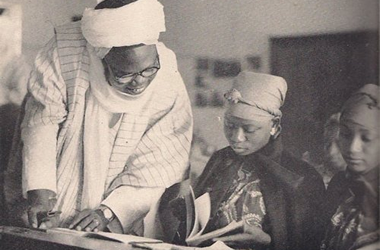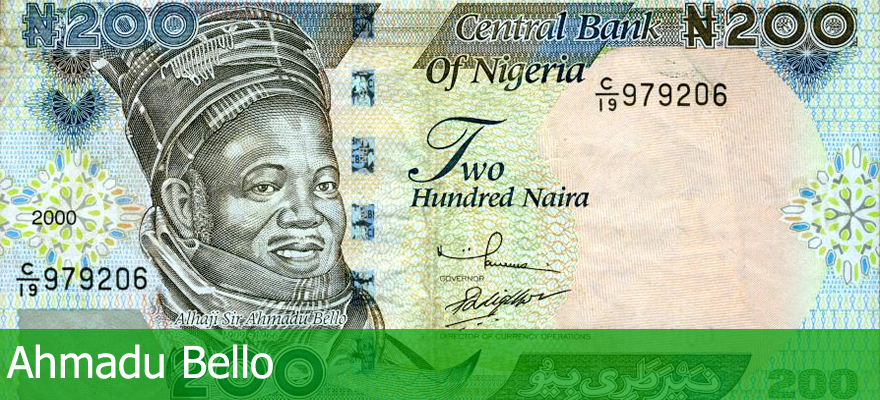Alhaji Sir Ahmadu Bello was a Nigerian political leader who served as the spokesman for Northern Nigeria during the country's struggle to gain independence from the British colonial government. Bello was the Sardauna of Sokoto and is considered one of the founding fathers of modern Nigeria. He combined traditional leadership qualities with a deep knowledge of Western governance.
Early Life
Ahmadu Bello was born on June 12, 1910 in Rabbah, Sokoto State to a district head and heir to the Sokoto Emirate. His great-grandfather was Sultan Bello, son of Usman Dan Fodiowho founded the Fulani Empire, the largest in sub-Saharan Africa. His early education was at the feet of Muslim masters studying the Quran, the hadiths and sharia law. He was later a student at the Sokoto Middle School, the only modern school at the time in the Sokoto province. He then enrolled in the Katsina Teacher's Training College for a further five years.
In 1948, he was offered a scholarship to study local government administration in England which he accepted as he wanted to increase his knowledge of the process of governance.
Political Career
As the urge to be involved in the government was the force behind Bello’s pursuit of education in England, shortly after his return he was nominated to represent the province of Sokoto in the regional house of assembly and was eventually elected. As a member of the assembly, he embraced a style of consultation and consensus in his representation of the northern emirates of Kano, Borno and Sokoto. As the movement for independence from the British Empire gathered momentum, Bello emerged as a strong advocate of federalism as the system of government most suitable for Nigeria. This was not unconnected to his desire to protect the north from what he perceived as the possibility of southern domination. He also served on the national constitutional drafting commission as a representative of the North. Bello later became a member of the regional executive council as Minister of Works. Over time, he headed various ministries in the Northern Region including works, local government and community development. In 1953 and 1957, he led the northern delegation during independence talks held in London.
Bello became the first premier of Northern Nigeria in 1954. In the 1959 elections, he led his party, the Northern People's Congress (NPC) to victory and a plurality of the parliamentary seats. The NPC forged an alliance with Nnamdi Azikiwe's NCNC (National Council of Nigerian Citizens - formerly the National Council of Nigeria and the Cameroons) to form Nigeria's first indigenous federal government which eventually won independence from Britain. In forming the 1960 independent federal government Bello, as president of the NPC, chose to remain premier of Northern Nigeria and devolved the position of Prime Minister of the Federation to the deputy president of the NPC, Abubakar Tafawa Balewa. He chose this path because he wanted to remain in the north and accepting the post of prime minister would have required living in capital city of Lagos, which was in the south. Bello was perhaps the most politically powerful person in Nigeria during the first five years of independence.
Political Achievements
Ahmadu Bello's many political accomplishments include the establishment of the Northern Regional Development Corporation or NRDC (subsequently known as the Northern Nigeria Development Corporation or NNDC), the Bank of the North, the Broadcasting Company of Northern Nigeria (BCNN) and the Nigeria Citizen Newspapers. The north was less developed economically than the south and Bello argued that it was necessary for the north to catch up for the sake of national unity. He travelled constantly across the north to meet with the common people and listen to their concerns.
Honours
He was awarded several honorary doctorates, including a doctorate in law from the University of Nigeria, Nsukka (UNN) in December 1961. He was also honoured by the United Kingdom, the country from which he had helped to negotiate independence, with a knighthood just before the end of colonial rule.
Legacy and Death
Bello's greatest legacy was the modernisation of Northern Nigeria and the unification of its diverse people.
He founded the Ahmadu Bello University in Zaria (the second largest university in Africa) in 1962. He was also the university's first chancellor. Nigeria's N200 note carries his portrait. He believed strongly in both national and Pan-African unity and rather than wasting time blaming the ills facing his country on colonialism, he instead set out to develop his region and to adopt from the West what suited Nigeria while retaining those cultural practices and values that were cherished and integral to the country's identity. His enthusiasm for federalism suggests that he believed that power was best shared across regions and clans rather than concentrated in the hands of an elite, a situation which would only result in jealousy and competition.
Ahmadu Bello was assassinated on January 15, 1966 in a coup which toppled Nigeria's post-independence government. He was still serving as premier of northern Nigeria at the time. His assassination was one of the factors that led to the subsequent civil war (1967-1970) when the southern region of Biafra attempted to secede.
Sources
Wikipedia page on Ahmadu Bello
Wikipedia page on the naira
New World Encyclopedia
BookRags.com
Chat Afrik
Picture Source: Trip Down Memory Lane


